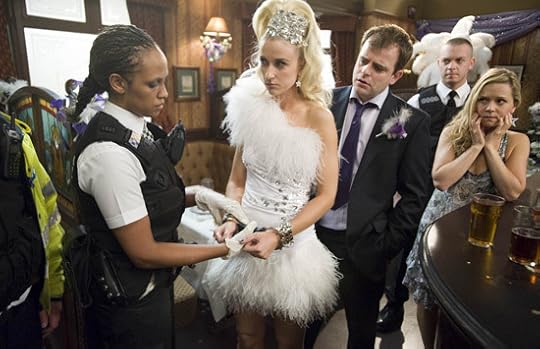Everything I know about writing, I learned from watching Coronation Street

I’ve been watching Coronation Street on CBC for the last twelve years or so. I’ve turned it on every weekday without fail since the year 2000. I think that Coronation Street and its Canadian fans have been misunderstood. Yes, we are addicted, but we are not crazy. For one, watching the show is relaxing and familiar and a good way to unwind, but I’ve also learned some great lessons about writing from Britain’s longest running TV show (no, really!).
It’s true that yes, the show does veer somewhat over the top at times, but the writers on Corrie know what they’re doing. They continue to impress me with their solid plot development, realistic dialogue and energetic pacing. These strengths take a while to appreciate fully. You can’t just watch part of an episode and stop because it seems boring, or you can’t understand their accents. (Trust me, you start to totally make sense of those accents within a couple weeks of watching the show. You’ll even be able to pick out the different dialects and you might even find yourself using some of their British aphorisms in your own speech—e.g. “I want nought to do with it! “I’m knackered” or “Cheers mate”).
I’ve heard of people criticizing the writing on the show as being simple, predictable or unexciting. Not true. As a writer myself I can tell you—there is some subtle genius going on in this program. Here are some of the top writing lessons I learned from watching my daily episode of Coronation Street:
Characters need to have dimension. For example, they might start out as a mild-mannered school-teacher who loves to read, but they could be quietly harbouring the urge to have a secret affair with a student and later go on to kidnap the student and hide her in an attic for five weeks, then end up murdering three people pretty much by accident. That kind of dimension.
Never make anything stay too good for too long. A smooth-sailing life is boring to watch or read about. No one wants to follow the lives of characters who are happy, in love or deliriously giddy about their situations. If you ever see someone on Coronation Street exhibiting these symptoms, stay tuned, because something really, really bad is about to happen to them.
Build tension slowly for the best effect. The plot in Coronation Street develops very, very slowly. Storylines are left simmering over many episodes to the point where you can’t stand it anymore. When the resolution finally happens, you usually can’t imagine it having gone any differently.
Interesting things must happen for a story to stay captivating. Yes, it is true that an abnormally high number of the people living on Coronation Street have been on trial for murder, and a great many weddings have been ruined by a shocking revelation, but why not? For someone to want to watch (or read) a story, there must be intriguing situations (and since the show has been on for 50 years, it’s natural that a few of these ideas have been recycled).
There must be climax moments to the story. The climaxes on Coronation Street are extremely fulfilling, usually because they have been building for many weeks (one of the characteristics of the show that make it so addictive). And every so often, you will get a jaw-dropping episode that stands as the climax of the decade—most recently, the tram crash of 2011. These are the moments when the silent power of this show is brought directly into the light for one glorious moment of celebration.



